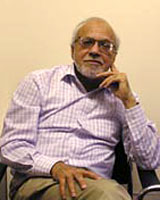Muslim ‘Parliament’ says: ‘We don't want this mosque’
by - 3rd March 2008
 British establishment architects and spin-doctors are taking the lead in building the country’s biggest mosque that senior Pakistani citizens warn the country does not need.
British establishment architects and spin-doctors are taking the lead in building the country’s biggest mosque that senior Pakistani citizens warn the country does not need.
The man who co-founded the separatist Muslim Parliament has denounced plans for a huge 12,000-seater mosque next to the Olympic site.
The Tablighi Jamaat’s PR company, Indigo, today launched its ‘charm offensive’ in the run-up to submitting proposals for the mosque on contaminated land in Newham, East London.
But Dr Ghayasuddin Siddiqui, Indian-born elder-statesman of political Islam in Britain told Lapido Media on Sunday: ‘We have too many mosques. I think it should not be built.’
The surprise comments from the head of an organization originally set up in the late 1980s to assert a Muslim identity and resist integration, adds weight to the growing Muslim resistance to the new mosque.
Siddiqui’s views are in line with other prominent Muslims like Irfan Al-Alawi, Europe director of the Centre for Islamic Pluralism, who has expressed ‘extreme concern’ about the spread of Tablighi Jamaat. They have dared to speak out against the proposals despite pressure from the Muslim Police Association, the London Mayor Ken Livingstone – and now Indigo PR who are handling their propaganda.
The mosque build is being seen as a test of strength by many observers around the world who are concerned it will tip a diverse city at ease with its multi-culturalism into an increasingly tense, religious politicisation.
Yet it is the establishment who are now leading the fight to get the mosque built. Indigo, a Christian company, have been funded by a wealthy Muslim businessman Suhail Sarbuland of Crossier Properties, to break down local resistance to the project. He has also secured the services of prestigious establishment architectural firm, Allies & Morrison, known for projects like refurbishing the Royal Festival Hall.
Now Indigo have planned three events, the first in March, inviting residents to visit the site, learn about what goes on there, and hear about initial plans. ‘This is a first step in actively engaging the local residents in West Ham and the wider community in Newham’ they say in an email communication.
Councillor Alan Craig, who leads the tiny Christian People’s Alliance opposition group to Labour-controlled Newham Council in whose ward the mosque would be built, believes that it is ‘ludicrous’ for Indigo to describe the proposal by a massive, secretive sect hailing from South Asia as a ‘community project’.
‘What we seem to have now is the bizarre spectacle of the British “posh” who should know better, joining forces with Ken Livingstone against Pakistani and Indian elders in a sort of post-colonial guilt trip showdown which is just mind-boggling’ said Craig.
The prominent Deobandi cleric and scholar Maulana Muhammad Ilyas Kandhalawi (1885-1944) launched Tablighi Jamaat in 1927 in Mewat, India, not far from Delhi. From its inception, the extremist attitudes that characterize Deobandism permeated the Tablighi’s originally a-political philosophy, according to the pro-American Middle East Forum commentator Alex Alexiev. Ilyas's followers were intolerant of all other faiths, including other brands of Islam, especially Shi‘ites. He writes: ‘Part of Ilyas's impetus for founding Tablighi Jamaat was to counter the inroads being made by Hindu missionaries. They rejected modernity as antithetical to Islam, excluded women, and preached that Islam must subsume all other religions.’
The group’s prestige grew in importance after Pakistani military dictator Zia ul-Haq encouraged Deobandis to Islamize Pakistan.
According to Craig, other research into fundamentalism is worrying. He said: ‘Scholars are saying that their insistence on ‘purity’ from the surrounding society and a return to the 7th-century methods of the warrior-Prophet creates a social vacuum that is disastrous for integration in a modern environment.’
The Tablighi Jamaat are from the same Deobandi denomination that spawned the Taleban in Pakistan – against whom Prince Harry has just been risking his life.
Despite claims that the mosque will meet existing need in the borough, the opposite is the case, and it is likely to attract sect supporters in a classic ghetto settlement pattern. One local Pakistani-born former Muslim who lives in the ward where the mosque will be built, told Lapido Media he knows of at least three families who have moved into his street from elsewhere in the country in the last couple of months just to be near the new mosque.
Read Muslim Parliament’s take on Islamism: http://www.muslimparliament.org.uk/HizbutTahrir.html
- Log in to post comments
